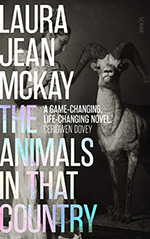
![]() bazhsw
bazhsw
6/14/2022
![]()
COUPLE OF MINOR SPOILERS IN REVIEW
I really liked this.
Vegan activists will tell you that they advocate and speak for animals because the voices of animals cannot be heard. We tell others of the harm that is caused, of the suffering and pain animals live with and how they deserve not better treatment (a welfarist position), but rather that they deserve rights as the unique beings they are, free of the suffering, servitude and death humans cause them (an animal rights position). This book takes the position of, 'what if animals could communicate with us' and the result is a rather wonderful depiction of what animals would say to us, and how they would say it if we could understand them.
The central premise of the book is that there a 'zooflu' (eerily like COVID-19, but conceived way before the pandemic) where people get sick and can hear what animals are saying. The implications are significant, because it may be wonderful having a chat with your pet dog but what if you could hear a dangerous predator like a crocodile, or what if you could hear every bird, or every insect? It can be a bit difficult to follow at times when the animals get talking because of course they don't have a natter like they have fallen out of a Disney film, they speak in a language of their own, and have interests which may appear somewhat alien to humans.
I really loved this element of the book, because it avoids a typically speciesist perspective that 'if animals could speak they would either communicate in grunts like beasts or speak in a fluent human language'. This book does not make it easier for the reader or the human. I think I read that the author has engaged with research of animal communication and it shows. Why wouldn't a Dingo communicate by smelling human faeces, or biting, or fur raising on it's back or farting or pissing? After all, human communication is far more richer than speech and text - why would we assume other non-human animals would be different. I picked up a real sense of the richness of animal communication whilst recognising it's fundamental difference to human communication. I am sure many in the West know that the Inuit have 'xxx' words for 'snow' and also that our language is often a reflection of our class, our culture and our needs globally. What I loved about this is that the motives of animals were not always easy to dechiper - as though they are speaking in riddles or metaphor. I'm reminded that I have a fantasy of being a polyglot and I spend time learning different languages (badly). The words may be in the right place and ostensibly recognisable but do I understand and am I understood? Unpicking the meaning and understanding of the animal communication is a challenge but ultimately rewarding.
The main human character in the book is a middle-aged woman called Jean who is a bit of a fuck-up. I kind of liked her, but she isn't presented as a particularly nice person or even a 'rough around the edges but heart of gold' type. She's got an alcohol problem, she has been treated badly and treats others in return badly. She makes pretty stupid decisions and whilst she loves her son and granddaughter isn't exactly a 'nice maternal granny' figure. There is a really clear analogy to a pack animal here - she treats sex as disposable and can come across as quite unfeeling, but she is fiercely protective of her young. I got her, and as an intentionally troubled character I appreciated reading her vulnerabilities, and at times found the text quite unsettling.
She works in an animal prison, depicted as a sanctuary in the book (it's a zoo to you), so there is a real interesting premise of what will happen when the virus hits the zoo and it is interesting seeing how the animals react. I would have liked to see this explored a little more to be honest.
What follows is a road trip to find her granddaughter taken from her, accompanied by a Dingo she raised from birth. It can be quite a touching novel at times, at others quite tense. It's really a novel about family, about your pack and about 'the family you find'. That Sue the Dingo considers Jean part of her pack speaks volumes and without getting into spoilers it becomes more and more important during the novel. Family is more than blood, it's who is in our pack, who looks after us and who we protect.
There are some scenes which I think could have been exploited more - there are times when Sue and Jean come across factory farm animals and it feels more like a missed opportunity to hear them. At the same time, this book serves as part of the canon of animal rights fiction without explicitly laying on the suffering caused by farming or zoos (it doesn't shy away from the mental trauma captivity causes animals). I also think that whilst my review is saying, 'listen to animals, advocate for them and go vegan', I don't think the book is saying that. It is asking the reader to consider how animals communicate, what their wants are and perhaps if more reflected on that they would consider their choices.
Glad I read this.